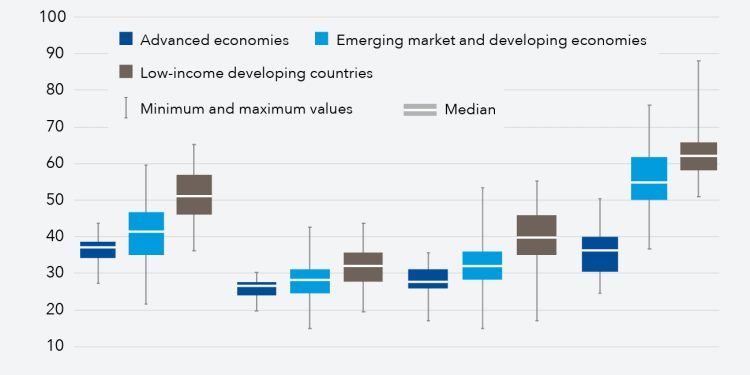Spending Smarter to Boost Growth
Over the past two decades, Rwanda achieved remarkable progress. Nearly every household now has access to mobile phones and primary education. More than half the population has electricity, and one in five has clean drinking water and sanitation services. Rwandans consume three times more electricity and live 20 years longer.
These gains came from relatively modest increases in investment, education, and health spending from $150 to $420 per person—which is even below the sub-Saharan African average. What made the difference in Rwanda was more efficient public spending. This approach is an answer to fiscal pressures stemming from slow growth, rising debt, aging populations, and growing demands for defense. The key is to make every penny of taxpayer resources count.
Our new analysis of 174 economies in the latest Fiscal Monitor shows that governments could gain one-third more value from their spending, on average, by adopting best practices. By spending more efficiently and better allocating existing resources, emerging markets and developing economies can increase output by 11 percent, and advanced economies by 4 percent, over the long term. Spending smarter is more than a fiscal tactic—it’s a growth strategy.
What spending smarter means
First, it means allocating existing spending better. In most countries, public investment, which can be growth-enhancing, has declined by 2 percentage points of total expenditure over the past two decades. Another such area is education, where public spending has remained modest at about 11 percent of total spending. At the same time, many countries are faced with high public wage bills, which account on average for a quarter of total expenditure.
Second, it means improving the “technical efficiency of spending”—the maximum achievable output given a fixed level of public expenditure. To measure this, we compare observed outcomes to best-practice management, technology, and institutional arrangements. For example, Canada spends about $2,500 per person annually on education—roughly $300 less than other advanced economies. Yet adults complete an average of 13.7 years of schooling, making Canada the second best in the world, behind Germany.
Significant economic gains
Smart public spending can substantially boost long-term growth in both advanced and developing economies.
Our analysis shows that shifting 1 percent of gross domestic product from lower‑impact government consumption into infrastructure investment raises output by about 1.5 percent in advanced economies and 3.5 percent in emerging market and developing economies over about 25 years. Redirecting the same amount toward human capital investment, for example by upgrading education systems, can yield around 3 to 6 percent, respectively, in those two country groups. Importantly, this reallocation of spending can also reduce income inequality.
Spending more efficiently amplifies these long-term gains. Improving investment efficiency by 10 percentage points can further boost output gains by 1.4 percent. The faster countries close these gaps, the greater and quicker the payoffs.
Complementary policies also matter. In advanced economies, pairing research and development with human capital investment enhances productivity. In emerging and developing economies, combining infrastructure spending with education spending balances near‑term and longer‑term gains: physical capital boosts output quickly, while human capital builds future productivity.
Making reforms work
Spending reforms are challenging. Countries often establish minimum legal levels of funding for education, health, and social protection. Public salaries and pensions are also hard to change. Globally, about one-third of spending is effectively “locked in,” with advanced economies facing the highest rigidity.
But there are good examples of how to move forward. Estonia and Sweden reduced rigidity by actively using multiyear fiscal planning, which requires new spending to be offset in future years. They also linked budget allocations more closely to past performance. This strategic approach to spending reforms is more effective than across-the-board cuts, which can disrupt essential services and reduce efficiency.
Combating corruption, strengthening the rule of law, and increasing budget transparency could also increase efficiency. Competitive procurement processes, improved management of public investment, and digitalization of public finances help too. Togo, for example, increased its investment efficiency by 5 percentage points after introducing cost-benefit analyses for all projects and multiyear planning in 2016.
Linking retirement ages to life expectancy, or emphasizing disease prevention to curb future health costs, can secure long-term sustainability of social spending. Aligning public compensation with market benchmarks and strengthening payroll controls are also key—especially in developing economies where public sector wages often exceed private sector ones by 10 percent or more.
Finally, spending reviews with clear objectives and links to budget decisions help governments identify savings and increase impact. In the Slovak Republic, such reviews uncovered potential savings of 7 percent of public expenditure.
The bottom line is this: by stepping up spending efficiency and better channeling existing resources, countries can strengthen public finances, build resilience, and increase their long-term economic growth.










